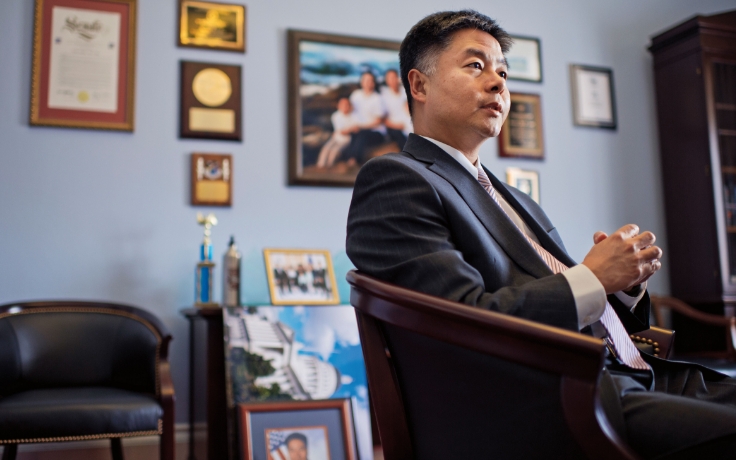Ted Lieu admits he’s “enthralled” by the potential of artificial intelligence to transform parts of society — and also “freaked out.”
The former Stanford computer science major, now serving his fifth term in the House of Representatives, is one of the most authoritative voices in Congress on AI and cybersecurity. A liberal Democrat and the rare member of Congress with anything like tech savvy, Lieu leads a bipartisan effort to erect regulatory guardrails around this fast-evolving technology. One early foray: He is co-sponsoring a bill to block AI from autonomously launching nuclear weapons.
One of some 80 Congress members with a record of military service, Lieu also helped spearhead legislation that has already greatly expanded permanent supportive housing for homeless veterans.
His district includes the South Bay, Santa Monica, and much of coastal Los Angeles County, a motherlode of Democratic donors. As vice chair of the House Democratic Caucus, he has been a prodigious fundraiser for party candidates.
Among them are women who are former military and CIA officers first elected to Congress in 2018. The group includes such marquee moderates as Abigail Spanberger (D-Va.), Elissa Slotkin (D-Mich.), and Chrissy Houlahan (D-Penn.), who first met Lieu as fellow Stanford undergrads and is also an Air Force veteran.
“Ted represents a community that’s further left than my community,” Houlahan said. “It’s easy for a person like that to see only that further left perspective, but he very much understands that we’re part of a whole, a spectrum of solutions.”
When Houlahan first took office, he helped “me and the other women navigate Washington.”
Still, Lieu is a bit of an anomaly.
Turn on a tape recorder and Lieu’s voice often grows quieter, not louder. There is none of Rep. Jim Jordan’s pugnacity, no stunts for the camera. He’s modest and no hog for the limelight. He favors a short speech over a long one. Since Donald Trump’s election, Lieu has built a following on X (formerly Twitter), trolling his Republican colleagues with dry wit.
And while he is dismayed about the current take-no-prisoners partisanship in Washington, Lieu retains an immigrant’s optimism. He joins with President Joe Biden in believing — and proclaiming — that there is no problem Americans can’t come together to solve.
Congress: Divided and without much tech savvy
THESE DAYS, IT’S ARTIFICIAL INTELLIGENCE that preoccupies Lieu, who is one of just four Congress members with a computer science background.
In a January New York Times op-ed, he warned of the perils if AI is “left unchecked and unregulated.”
When he sat down to write the essay, Lieu asked ChatGPT to draft “an attention-grabbing first paragraph of an Op-Ed on why artificial intelligence should be regulated.” That paragraph, which became the lead in the published piece, “surprised” him with a compelling argument that closely reflected his views. The rest of the work was his own, not that of ChatGPT.
Government and industry are moving too slowly to protect Americans from AI’s most dangerous applications, he argued. Driverless cars can crash and kill, political deepfakes spread misinformation that could destabilize our democracy, and the algorithms that power facial recognition software too often discriminate against people of color.
A good first step, he believes, would be for Congress to pass laws adopting non-binding standards issued recently by the National Insitutue of Standards and Technology. The standards are designed to help public and private organizations build “trustworthiness” into the design, development and evaluation of AI applications.
Toward that end, Lieu is co-sponsoring a bipartisan bill that would create a 20-person commission to recommend new regulatory approaches to govern technology. Members, to be named by both Democrats and Republicans, would have real-world experience in computer science or AI, and would be drawn from civil society, industry, labor, and government. The commission would have a year to produce a final report.
UCLA Professor Sarah T. Roberts, who studies AI, supports the legislation. But, she worries. “It’s so late in the game.”
“I think that we need numerous interventions of this nature,” she said, with “more public-facing accountability. Conversations as opposed to closed-door meetings with invited parties.”
She also fears the panel “will be too beholden to industry.”
While Congress considers the merits of such a commission, Lieu said, lawmakers need to move forward. As he notes, “Nothing precludes us from passing regulation in the meantime.”
A particularly urgent priority in this regard is the bill to block nuclear launch by autonomous AI — a doomsday scenario straight out of Stanley Kubrick’s 1964 film, “Dr. Strangelove.”
The measure, which Lieu introduced in April with Republican and Democratic co-sponsors, would bar the use of federal funds for launching any nuclear weapon without “meaningful human control.”
For Rep. Houlahan, the bill is a no-brainer.
A human factors engineer in the Air Force, she helped design the weapons command and control interface in the event of a nuclear attack.
“Ted and I definitely have common heritage in making sure that humans are part of the equation if we’re under nuke attack,” she said.
From the Torrance Council to Washington, D.C.
NOW 54, LIEU ARRIVED IN WASHINGTON IN 2015 after nine years in the California Legislature. Before that, he sat on the Torrance City Council.
His personal story continues to guide his political agenda. Lieu was three years old when his parents immigrated to the United States from Taiwan. The family first settled in Cleveland, Ohio. Lieu’s parents made ends meet by selling gifts at flea markets and eventually were able to operate six gift stores where he and his younger brother worked as teenagers.
After Stanford, Lieu attended Georgetown Law School, then enlisted in the Air Force. He served on active duty in the JAG Corps.
Military service sparked his interest in veterans’ affairs. Soon after arriving in Washington, Lieu partnered with California’s Sen. Dianne Feinstein to speed construction of veterans housing on the West Los Angeles VA campus, then in his district.
In the years since, the expanded use of public-private partnerships and the streamlined construction their legislation made possible has produced 233 new apartments for homeless veterans on that campus, with an estimated 374 additional units to come online.
At a June groundbreaking, Lieu’s five-minute remarks were the shortest of the dozen or so speakers.
That’s vintage Lieu, noted Lisa Greer, a Los Angeles-based nonprofit fundraiser who supports him and other Democratic candidates.
“Ted is not the guy who’s going to be the life of the party,” she said. But he brings “stability and thoughtfulness and humility. Those are things we don’t have a lot of.”
Stopping “stupid stuff”
TEENAGE SKATEBOARDERS DO OLLIE JUMPS in the empty plaza outside Lieu’s West L.A. field office. The aged municipal building, steps from a Persian restaurant and the Nu-Art Theater where “The Rocky Horror Picture Show” has screened regularly since 1976, also houses field offices for City Councilmember Traci Park and Supervisor Lindsey Horvath.
In his private suite, Lieu is in his perennial dark blue suit and white shirt. Photos of his two sons and his wife, Betty, a member of the Torrance School Board, adorn the walls and his desk. Papers sit in military-straight piles.
As backbenchers in the Republican-controlled House, Democrats control few levers of power. Yet Lieu still sees options.
“It’s really important to stop stupid stuff,” he said. Default by the federal government, for example — which Congress barely averted in June by raising the debt ceiling — “would have been catastrophic.”
Now, Republicans angry at that agreement by their moderate colleagues threaten a government shutdown this fall. “We need to prevent that,” Lieu said. As far-right Republicans argue to cut funding to Ukraine, “We must give Ukrainians what they need to defeat Russia. So far we’ve succeeded.”
It wasn’t always this way, Lieu recalled. Most of the time when Lieu was in the state Assembly and Senate, “I worked pretty well with Republicans.
“But five or six years ago, I’d see an apple and my Republican colleagues would see an orange. If you can’t agree on the same facts, you can’t get things done.”
Prior to the pandemic, he remembers talking with a conservative Congress member about sports. The colleague then told Lieu he was working on a bill to ban Sharia law.
“It was so odd, that we could have a totally normal conversation. Then this. I wanted to say, ‘What are you thinking?’
“In politics, you can get these insane views.”
That incredulity comes through in Lieu’s Twitter feed.
In one tweet, he stands in front of his office, holding a large bag of popcorn with an impish smile, noting, “About to go to the House floor.”
Days after the January 6 insurrection he tweeted, “I just want to note that in America, you don’t get to have one free coup attempt. That’s why we are readying Articles of Impeachment for introduction this Monday.”
Lieu was one of the nine managers for the 2021 House impeachment hearings.
Yet, despite the turbulence and peril of this moment, he said, bipartisan bills are still being passed in the House and Senate and signed into law.
“We don’t read about those bills in the same way we don’t read about planes landing.”
Lieu is betting that his legislation to check the most dangerous uses of artificial intelligence will appeal to what’s left of Washington’s center.





















